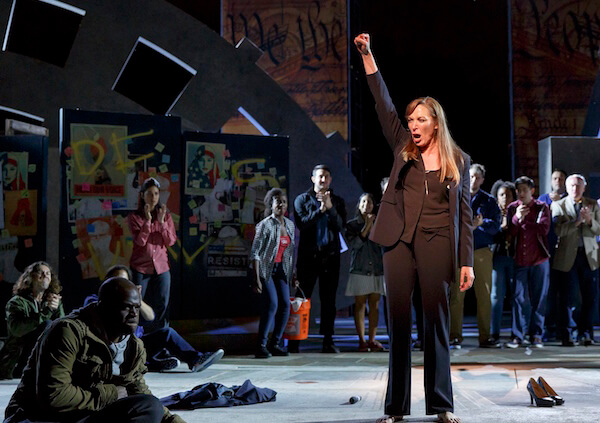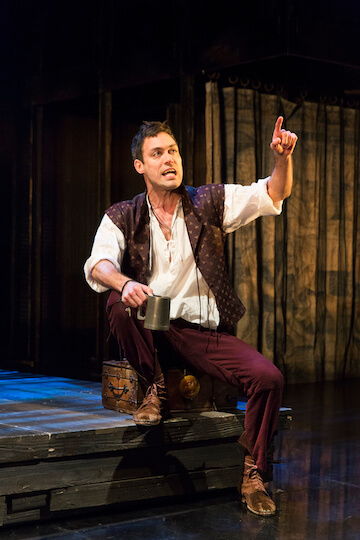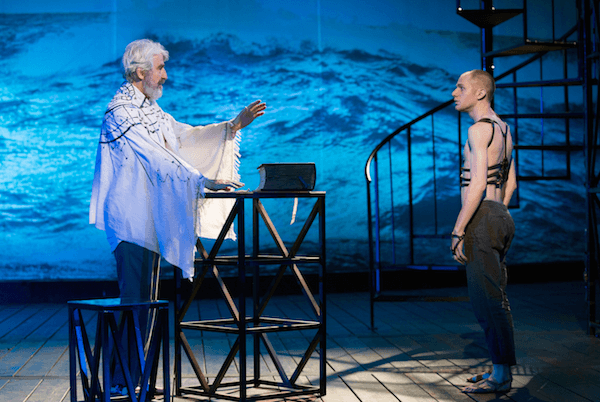Orland Bloom as Romeo, after taking off his helmet upon his first appearance on stage.
Find an attractive though antiseptic man/ boy and put him in a romantic situation that’s sexually charged but ultimately harmless, and let teenagers project their developing sexual fantasies onto him. It’s an entertainment formula that dates from the dawn of romantic literature and has been used by celebrated authors including Jane Austen; it’s powered Disney’s teen movies and driven the profits of boy bands. Teenage swooning over imaginary romance — where real sex is unimaginable — also overrides a multitude of artistic sins. Shallow characters and plotting and insipid music are acceptable, even expected, in such undertakings as they are secondary to the emotional froth. On Broadway, add in a young movie star who has made pretty but bland portrayals of romantic figures his stock-in-trade.
That’s the marketing calculus behind David Leveaux’s production of “Romeo and Juliet.” If that’s your thing or you’re bringing along a kid besotted by, say, the band One Direction, by all means go. If, however, you like your Shakespeare a little more substantive, you might look elsewhere. Leveaux’s cutting keeps the play at a relatively quick two hours and 20 minutes, but his staging — aside from some pipes that periodically flame, providing the evening’s only real heat — is pedestrian. Everything about it lacks believable passion, as if this were a production deemed acceptable for high school students by a highly conservative school board.
“Romeo and Juliet” is cold, almost completely lost; “The Fantasticks” recaptures its warm heart
At the center of this production is Orlando Bloom as Romeo, an actor known for his roles in the “Lord of the Rings” and the “Pirates of the Caribbean” franchises in which he honed the wan romanticism he brings to this performance. Showing up and being handsome may work when the camera is doing all the heavy lifting, but Bloom’s Romeo ends up being a tedious two-note performance juxtaposing mooning romanticism and angst-ridden hollering. There is no subtlety, no change in Romeo when he abandons his passion for Rosaline in Juliet’s favor or even when he’s been banished. The balcony scene (here seen as a kind of nautical prow thrusting in from the wings and appearing ridiculously phallic) is superficially lyrical but emotionally empty.
Bloom handles the language well enough, but it doesn’t inhabit his body. Leveaux has done Bloom no favors either by having him make his first entrance on a motorcycle in a helmet. Not only is this awkward, but someone as youthfully reckless as Romeo would never bother with such a prodigious helmet –– unless, that is, it allowed a reveal of a handsome face that guaranteed whoops and applause from the audience. This, in one action, is the problem with the whole performance. It has been staged for affect rather than authenticity. As a result, it has a coldness that keeps everything at a safe distance.
Bloom gets little help from Condola Rashad as Juliet. Rashad is a terrifically gifted actress, but here she has been directed to play Juliet as the 13-year-old imagined by Shakespeare. Well, not quite. She’s the kind of 13 one finds at a modern mall rather than a girl bordering on womanhood used by her family as they angle for greater fortune. Rashad pitches her voice high, presumably to connote youth, but it’s annoying and false. She never believably conveys the awakening sexuality that emboldens her to thwart her parents’ ambitions. Juliet’s clinches with Romeo, though prolonged, are chilly and played safe, like all the sex in this production.
There are a few bright spots worth noting. Brent Carver as Friar Laurence brings a level of believable conflict to his role in abetting the star-crossed lovers. Christian Camargo, excellent as the bitter and witty Mercutio, gives the most developed performance in the piece, making clear that sarcastic urbanity is a façade that masks vulnerability. Jayne Houdyshell is sublime as the Nurse, finding comedy and sensitivity in the role that make her both affecting and realistic. The relationship portrayed by her and Rashad provides the most authentic human interaction in the play. To put it bluntly, Houdyshell and Camargo deserve a better production around them.
By the final scene, the characters merely stand around and talk, effectively obscuring the rapprochement between the families the lovers’ deaths have brought about. With Romeo and Juliet gone, Leveaux seems baffled about what to do in the final stretch to the curtain call, when once again the fans can scream over Bloom. All of this may work as entertainment packaging, but it does precious little for Shakespeare.
Evy Ortiz and Jim Schubin in “The Fantasticks.” | GRAHAM DOUGHERTY
A bit of theater history passed almost unnoticed a week or so ago. “The Fantasticks” reached its 20,000th New York City performance. It took a bit more than four decades to get there. The current revival at the Jerry Orbach Theater has been quietly racking up performances for just over seven years, and I have to admit I wasn’t very kind to it when it first arrived in 2006. However, casting always makes the difference, and the current ensemble has recaptured the innocence and irony this show demands if it is to succeed.
Central to this success is the fine performance by George Dvorsky as El Gallo. He is much more than a wonderful voice. Finding nuance in the character and perspective in the poetry, he draw us into the complex themes of innocence, experience, hope, and love. MacIntyre Dixon as the Old Actor is delightful, offering impeccable comic timing. Jim Schubin as Matt and Ali Ewoldt as Luisa sing beautifully and seem real, though, of course their characters are abstractions.
This production has found its heart again in this cast, and it’s definitely worth a visit. If it’s been a while since you’ve seen it, you may be surprised how you’ve changed and you’ll certainly be delighted to see the luster restored to a show that’s always been a gem.
ROMEO AND JULIET | Richard Rodgers Theatre, 226 W. 46th St. | Tue., Thu. at 7 p.m.; Wed., Fri., Sat. at 8 p.m.: Wed., Sat., 2 p.m.; Sun. at 3 p.m. | $85.75-$240 at ticketmaster.com or 212-307-4100
THE FANTASTICKS | Snapple Theater Center, 1627 Broadway at 5oth St. | Mon.-Tue., Fri.-Sat. at 8 p.m.; Wed., Sat. at 2 p.m.; Sun. at 3 & 7 p.m. | $51.50-$76.50 at ticketmaster.com or 212-307-4100



































